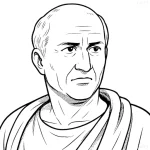“Liberty consists in the power of doing that which is permitted by the law.”

- January 3, 106 BC – December 7, 43 BC
- Roman
- Orator, Philosopher, Statesman, Lawyer, Author
table of contents
Quote
“Liberty consists in the power of doing that which is permitted by the law.”
Explanation
Cicero defines liberty not as the ability to do anything one desires, but as the freedom to act within the boundaries set by just law. This conception of liberty is structured, rational, and civic-minded, where individual freedom is exercised in accordance with legal and moral order. The law, when aligned with reason and justice, does not restrict liberty but makes it possible by protecting rights and limiting harm.
This understanding reflects Cicero’s deep commitment to the ideals of the Roman Republic and natural law theory. He believed that true liberty could only exist where the rule of law prevailed, and where that law was rooted in reason, equity, and the common good. Without law, liberty would dissolve into chaos or tyranny; with it, citizens could act freely but responsibly, upholding both personal dignity and public order.
In modern democracies, Cicero’s principle continues to guide constitutional thought. Liberty is not the absence of restraint, but the presence of lawful freedom—where individual rights are balanced by social responsibility. His words remain a timeless reminder that freedom thrives not when laws are absent, but when they are just, rational, and fairly applied.
Would you like to share your impressions or related stories about this quote in the comments section?

